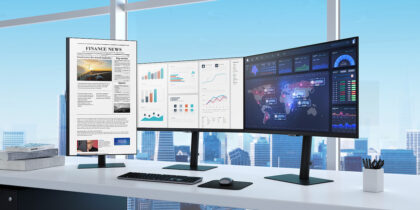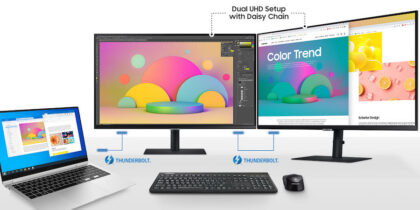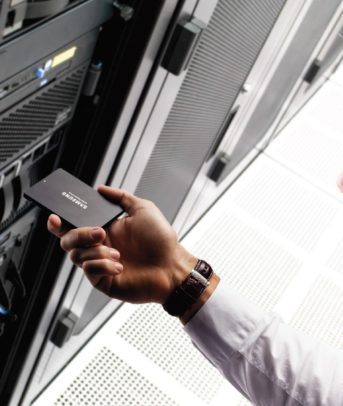There is much debate about the benefits of laptop vs. tablet computing. The first laptops appeared in the 1980s. Since then, they have become progressively more powerful and less bulky. Business laptops have revolutionized the workplace, freeing employees from their desks and allowing them to work wherever they wanted, whenever they wanted, while still accessing core enterprise applications and resources. Tablet computer adoption has expanded rapidly in a few short years since 2010, with unit sales now surpassing that of personal computers. According to Gartner, in 2015, 21 percent more tablets will be sold than desktop computers and notebooks combined.
A 2015 Spiceworks survey found that 83 percent of organizations support tablets in the workplace. However, it also found that the debate is not merely notebooks against tablets. Eighty-five percent of tablet users use them in conjunction with laptops, rather than as replacements for laptops. Regarding ease of use, the Spiceworks report shows that business laptops perform almost on par with desktops for a variety of purposes, including searching the Internet, viewing, sharing, storing, creating and editing documents and completing online forms. In contrast, their performance was judged to be lower for other tasks that require more computing power, such as programming. This is, however, likely to change as office productivity applications are increasing in availability and power. As a result, the research found that more than three-quarters of respondents would likely consider tablets as a primary work device.
Where Laptops Win
Laptops have long been the device of choice for traveling employees, especially those working extensively on documents, specialized IT functions or software development. They generally provide more storage for a lower price than tablets and are easier to connect to peripherals such as projectors or printers. However, they generally require users to carry power cables due to limited battery power.
Notebook PCs are generally preferred by those looking for all the benefits of a desktop computer with the convenience of mobility. Their built-in keyboard and touchpad make it much easier to create and edit documents since they allow users to type faster and more accurately than on a tablet. Laptops are also better suited for frequent swapping between windows and applications. They allow for full versions of applications such as Office to be installed, whereas tablets generally provide access to limited features within these programs. For the same reasons, laptops are best suited for those who need to work on highly specialized applications.
Where Tablets Win
When tablets were introduced, they were largely seen as consumer devices, allowing users to stay connected and consume content. Criticism of early tablets included their lack of physical keyboards and the fact that users were restricted to performing one task at a time. Now tablets come in a variety of form factors, with some having long battery lives, high-end processors and large storage capacities. Some, especially those based on the Android™ operating system, support multitasking and accessories such as wireless Bluetooth keyboards.
Tablets are increasingly being used in the workplace because they allow employees to be productive wherever they are. According to the Spiceworks survey, 63 percent of respondents said that the top business benefit of tablets was enhanced mobility, while 45 percent said improved productivity and 42 percent said increased availability. Productivity is a key theme. According to a 2014 study from IDG Enterprise, providing employees with tablets increases their productivity by 66 percent and increases their satisfaction by 69 percent.
Tablets are demonstrating their benefits in a wide range of industries, especially those where workers are not tied to their desks such as healthcare, education, hospitality and training. They are particularly useful for field workers, in rugged outdoor workspaces and in logistics and environments such as warehouses.
Both Laptops and Tablets Drive Productivity
When weighing laptop vs. tablet, each device has its place, and both are leading to improvements in worker productivity and mobility. Laptops revolutionized the workplace and continue to be the device of choice for many needs, especially where users need to work extensively on documents and to store large amounts of information. Tablets are still seen more as a vehicle for consuming information, but that is changing as more work-oriented applications become available. With Wi-Fi and, for some models 4G connectivity, tablets can provide greater mobility than laptops in a wider range of locations, their touch displays are bright and crisp, and they offer extended battery life.
For many, though, it is not just a laptop vs. tablet debate. Rather, they are often seen as companion devices. But whichever a particular user prefers, one thing is certain: they both have contributed in transforming productivity and workforce mobility.






